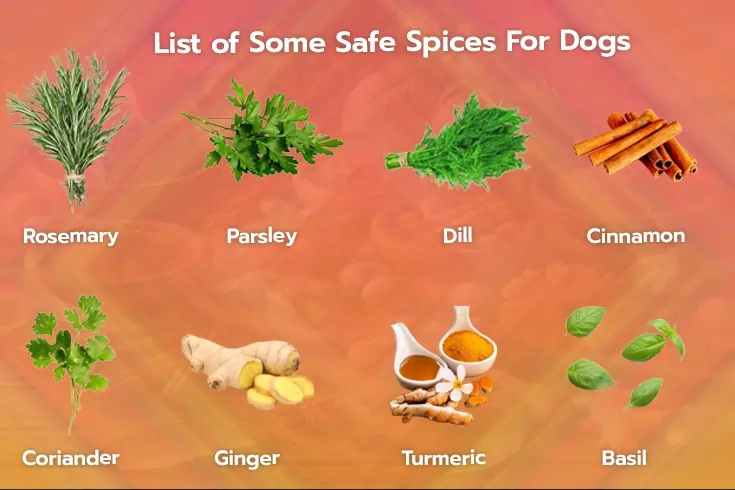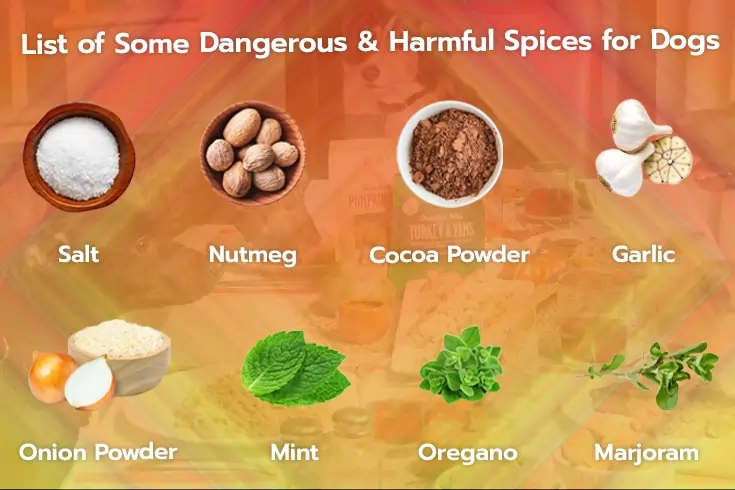
8 Herbs and Safe Spices for Dogs | What’s Dangerous?
Dogs are considered the most amazing creatures for human beings and keeping them healthy is all humans can do for them. When it comes to a dog’s dietary needs, the food options are abundant. Well, among various food varieties, nothing could compare to well-seasoned food that can add some to your dog’s meals.
Sometimes, dogs also appreciate the flavor of their food. Though onions, garlic, and salt are considered unhygienic and healthy, that doesn’t mean you can’t give them any spices, and their food needs to be flavorless. Some herbs and safe spices for dogs are healthy and tasty to add to dog food. Pet Life Expert has distinguished the apparent differences and details between herbs and dogs’ spices treat to make their meals delicious.
Note:
When it’s about giving new food, product, herbs, and other ingredients to your dog, it is always recommended to ask pet life veterinarian or nutritionist help which will guarantees the safe and healthy diet proceeding.

What are Spices? Can Dogs Taste Spice?
Like humans, dogs can also taste spices, although their taste sense greatly vary from humans. Compared to humans, they taste buds in dogs are less. Spices add flavor to your dog’s food, including aromatic plant parts like roots, seeds, fruit, and bark. At the same time, a minimum number of safe spices for dog food, including ginger, turmeric, and cinnamon.
Some safe options are cinnamon, parsley, ginger, basil, turmeric, oregano, rosemary. However, some spices are considered totally unhealthy for dogs due to their properties, which cause potential digestive upset and toxicity. Hence, scheduling your time with a vet or nutritionist before adding those spices to your dog’s diet is advised.

What Are Herbs? Are Safe Herbs for Dogs to Eat?
Dogs can potentially benefit from a lot of herbs. Herbs are the widespread plant group that is, somehow and in a small amount, safe to give to your dogs. Like spices, all herbs are not safe but toxic to your dogs. Some herbs, like cocoa and nutmeg, must be avoided in your pup’s diet.
It is highly recommended that you consult your vet before giving these spices to your dogs. That‘s because they might contain certain chemicals that can harm your pets when given consistently, even in a small amount. Also, start giving any kind of herb in appropriate quantities and monitor them for any kind of adverse reaction or allergies.

List of Some Safe Spices for Dogs to Eat
Spices are considered safe only when they don’t trigger any adverse reaction or allergies when given in moderation. Below, we’ve compiled 8 of many spices that won’t harm your dog when moderately given per nutritionist or vet recommendation.
1. Rosemary
Rosemary is an evergreen shrub with thin leaves and purple, blue, pink, and white flowers. Most of you may already know that rosemary adds a woodsy flavor to your dog foods, but you might be surprised to learn that rosemary has a nutrient profile. That means it can promote immunity and heart health when used in moderation. It has antibacterial properties that can be used as a natural preservative for your dog food.
2. Parsley
One of the flowering plant safe spices for dogs is parsley, which has unique breath-freshening ability. This is widely used as a spice to add flavor to human foods. While it is safe for humans, it is considered the best option due to its anti-inflammatory properties that help dogs with arthritis symptoms. One of the detailed experiments and studies shows that the intake of parsley can inhibit the growth of cancer cells.
3. Dill
Dill is an annual herb with seeds and leaves used as a spice or herb to flavor foods. In addition to vitamin C, calcium, magnesium, potassium, iron, manganese, dietary fiber, and amino acids, dill is a good source of vitamins B2, B6, and B9. It can improve your dog’s digestive system, lower acidity and cramping, assist with foul breath, relieve inflammation, and freshen their breath.
4. Cinnamon
Cinnamon is an excellent addition to dry dog food like biscuits, obtained from the inner bark of many tree species. It will add flavor to their food and provide health benefits. Due to their anti-inflammatory properties, they can help with stiffness and joint pain, particularly in senior/older dogs. It is also said that it improves combat hypertension and increases circulation.

Purina Pro Plan Sensitive Skin and Stomach Dog Food Dry, Adult Salmon & Rice Formula, Digestive Health – 40 lb. Bag
- Brand: Purina Pro Plan
- Flavor: Salmon & Rice
- Age Range: Adult
- Item Form: Kibble, Crunchy
- Specific Uses For Product: Allergy Relief; Digestive Health; Hip and Joint Support; Immune Support; Skin and Coat Health

5. Coriander
It is another annual herb for dogs, which is the safest and non-toxic ingredient to add in your dog food. Pet parents can add a small quantity of coriander to their diet to help them with better digestion. Coriander is also beneficial for relieving stomach pain and nausea. However, its large consumption can negatively impact your dog’s health. Coriander benefits dogs with diarrhea treatment, gas relief, better digestion, and nausea alleviation. That’s because it is a good mineral and vitamin source.
6. Ginger
For dogs with delicate stomachs, ginger is an excellent digestive aid that can help prevent nausea and vomiting. Ginger may also be able to kill heartworm larvae in dogs that have just contracted the infection, according to one encouraging study. When given in an appropriate amount, ginger is very helpful in digestion improvement, relieving motion sickness and nausea. Also, you can add ginger to your dog food in powdered, fresh, even in supplement form.
7. Turmeric
Turmeric’s main ingredient, curcumin, is an antioxidant with antibacterial, anti-inflammatory, joint support, and wound-healing effects. It is generally a safe herb for dogs that can be used as a flavor and color enhancer. Adding a small amount of turmeric is not a problem in your dog’s food. Turmeric is one of those safe spices for dogs that won’t do any harm to them if served moderately. Never add it to your dog’s diet if they are dealing with pre-existing health conditions or medication.
8. Basil
Dogs can benefit from basil in many ways. It helps with blood coagulation and is high in vitamins A and K, essential for healthy skin and eyes. For dogs with diabetes or those prone to hypoglycemia, basil is an excellent nutritional inclusion because it can help control blood sugar. Although Basil is considered non-toxic for dogs, it is good to add it slowly in your dog’s diet. You must confirm from ASPCA and other sources to understand it’s toxicity level.
List of Some Dangerous & Harmful Spices for Dogs
Now that we’ve discussed some safe spices for dogs, let’s move towards some herbs and spices that are hazardous to dogs, others can irritate their digestive systems. The following is a reference list of spices and herbs that are bad for dogs:
1. Salt
Salt is the first spice that your dogs must not ingest. That’s because too much consumption of salt in a dog’s diet can potentially lead to a deadly condition called hypernatremia. For various bodily functions, dogs need salt in their diet, but more than appropriate amount can be harmful for dogs. Excess of it can be harmful, leading to thirst, toxicosis, frequent urination, diarrhea, and even seizures.
2. Nutmeg
Dogs may have hallucinations, seizures, a fast pulse, and elevated blood pressure due to the chemical component myristicin, which is present in nutmeg. It must be kept out of reach from your dog. It can also cause other severe health issues like increased heart rate, seizures, hallucinations, and disorientation. Small amount of baked nutmeg is not toxic but large quantity can impact your dog’s health.
3. Cocoa Powder
Because of its high theobromine concentration, cocoa powder is one of the most harmful types of chocolate for dogs. Excessive consumption may result in an upset stomach and possibly organ failure. cocoa powder contains some harmful compounds that can affect dogs’ health in several ways like diarrhea, seizures, vomiting, tremors, and in rare cases it may lead to death.
4. Garlic
Many pet parents might not know, but a thiosulfate component found in garlic can potentially harm your dog’s red blood cells, hence, you must not give them garlic. Aside from that, garlic is toxic in many other ways including gastrointestinal issue and anemia. Additionally, you might notice some symptoms like diarrhea, pale gums, lethargy, and increased heart rate(tachycardias).
5. Onion Powder
Onions, like garlic, contain thiosulfate, which can damage your dog’s red blood cells. Not only onion, but also all onion plant forms whether powdered, cooked, or fresh are harmful for dogs. The compound Thio sulfinates and disulphides in onion can cause severe health issues and a hemolytic anemia condition. That’s why it is advised not to give your pup onion or onion powder.

6. Mint
Mint is considered the most helpful choice for humans, but that’s not true for dogs. Because mint contains essential oils that can cause lethargy and digestive upset in dogs. Although some dog foods contain mint, but they might contain harmful chemical pulegone that could lead to liver damage. Wintergreen and mint-flavored sweets are also not good due to artificial sweeteners and additives.
7. Oregano
Another herb is oregano, which can be tasty for humans to add taste but is one of those not safe spice for dogs. When it comes to dogs, it can lead to low blood sugar and stomach upset. Oregano oil is too strong for dogs, and it is not recommended at all for dogs with any kind of medical condition. To avoid digestive issues, don’t include it in your dog’s diet.
8. Marjoram
Dogs who consume marjoram experience unsettled stomachs and may even see a slowdown in their blood-clotting processes. Marjoram is among those spices that can affect your dog’s health in many ways like blood sugar levels, heart rate, vomiting and diarrhea, and stomachache. Therefore, even a small amount of marjoram is not advised giving to your pup.
Note
In case your dog gets ill or suffers from any serious health condition, it is suggested to immediately seek a vet’s assistance. Additionally, you can get in touch with the pet help center or helpline to ensure your pet’s safety.
It’s An End
As highlighted, if you know which are the right herbs and safe spices for dogs, you’ll add them as the tasty and nutritious supplement to your dog’s diet. Your dog will undoubtedly give you a hug of approval if you sprinkle parsley or basil on their treats. Avoid well-known harmful herbs and spices, such as nutmeg, salt, garlic, and chocolate. Before including herbs and spices in your pet’s diet, discussing pet-safe options with your veterinarian is a good idea. Also, remember that not all herbs are safe for cats, just like dogs. Both herbs and spices must be given after veterinarian and nutritionist consultation.
FAQs | Frequently Asked Questions
Can Dogs Eat Thyme?
Yes! Thyme is considered non-toxic for dogs but give it in small/ moderate amount. It offers antioxidant and anti-inflammatory benefits. However, don’t offer excess of it to dog.
Is Pumpkin Spices Safe for Dogs?
Compared to thyme, pumpkin is not good for dogs. You can feed pure pumpkin but avoid pumpkin spice because it contains cloves and nutmeg that are bad for dogs’ health.
Can Dogs Have Paprika?
No! Paprika is not good for dogs, it has capsaicin that could result in digestive upset, diarrhea, and vomiting. It can also cause digestive discomfort and irritation.
Are Human Spices Good for Dogs?
No! Not every human spice is good for dog. Some offer health benefits if appropriate amount is fed like ginger and turmeric. While other could result into harmful reactions like onion, salt, and garlic.



